
FIVE FROM THE FIRE #7
page 2
christopher funderburg & john cribbs
christopher:
But... what do you know, there is a 35mm print! Here in the warehouse! With Hebrew subtitles? Sure. I grab the cans and set them down on the sidewalk next to Night of the Hunter. Not a bad double-feature actually: two deeply strange pseudo-Hollywood outcasts.
In the Heat of Passion is representative of vanishing things: softcore (internet hardcore decisively killed it), America's Most Wanted (in another 10 years, no one will know what this show was and the plot of the movie will be hard to understand), vhs (we're now moving into the death of the next generation, dvd.) Flender's film seems blissfully consigned to its untimeliness, unafraid of being passed by in the natural flow of mass media culture. The film has no pretense to Importance and, strangely, that's what gives it's vitally in the face of complete irrelevence. It feels alive because it seems completely unashamed to be a quickly produced cheapie, perfectly happy to have its moment and die. Billy Wilder, on the hand, was barely just too self-conscious about making Important Films and tinged his films just slightly too much with commentary about The Times in Which We Are Living. He's not Stanely Kaufman or Norman Leer or anything, but his films are just as trapped in their era as In the Heat of Passion is in its - Wilder's work is the flip side of the coin. Despite the urgency of the fire, I'm hesitant. My lack of enthusiasm for Golden Age Hollywood is well-known and none of Wilder's films inspire me. Additionally, Sunset Boulevard and Some Like It Hot are his two most lauded works and I am completely indifferent to them. This place is filling up with smoke, so maybe I should get a move on it.
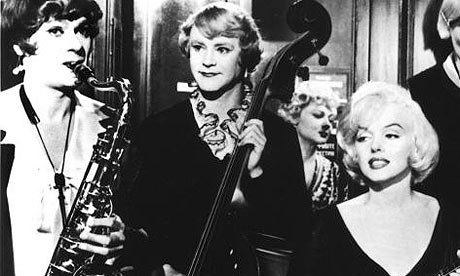
Bertolucci, Hitchcock, Wilder... I move swiftly but aimlessly through the aisles, trying to get my head together. Wilder's work reminds me of Leonardo DaVinci's scientific essays. It's science fact that DaVinci was a genius, a peerlessly astute thinker and a talented writer to boot. The scientific essay is a tough form to master and, like most things, he excelled at even that. But, unfortunately, he's always writing about issues that are long since settled. For instance, he wrote a detailed argument about how clam fossils ended up in the top of mountains. In his day, the issue was far from settled and theories abounded, DaVinci threw his hat in ring and speculated on an explanation. He's a clever thinker and presents an interesting argument, but the fact of the matter is: he's trying to convince me, the reader, of something that's long since settled. Whatever the virtues of the essay, there's a certain level on which it's uttterly pointless for me to read it: he's refuting ideas that are way out of date (ideas that literally nobody holds anymore) and using an outmoded set of "facts" to advance his own ideas. Same thing with Wilder: I don't need Ace in the Hole to key me in on the fact that - gasp! - the media is a scummy and suspect institution, nor do I need Sunset Boulevard to shatter my idealized views of the Hollywood dream factory and it's super-happy starlets, living perfectly content, well-adjusted lives. Same thing for the aggressively mild examinations of gender roles in Some Like It Hot. At this point, who needs The Apartment to blow the lid off of the unsavory, depressing aspects of corporate life or the very existence of extramarital affairs? It's not that I disagree, he's just taking sides and making points in a cultural debate long since settled. His films are timely, rarely timeless. The great writing is in service of a whole less than the sum of the parts. It's frustrating because he clearly is a good filmmaker.
Dammit, I don't want to die of smoke inhalation. Let's make some decisions. Speaking of films important for perverted and pathetic reasons: Bertolucci. It's a hilariously sad fact that Bernando Bertolucci's career since The Last Emperor is most notable for having featured two unbelievaby hot actresses in an amazing variety of states of undress. The Dreamers and Stealing Beauty, and their repeatedly naked stars Eva Green and Liv Tyler, are not very good films by just about any measure, but an excess of scenes featuring ridiculously beautiful naked women is way more notable than anything The Sheltering Sky and Little Buddha have going for them. Besieged is notable for being the only passable film starring the theoretically talented, endless underutilized actors David Thewlis and Thandie Newton. Still, "an ok movie starring David Thewlis" doesn't really compare to "constantly naked Eva Green." And to stay even more impressively on theme: The Conformist is even more painfully of its time than any of Billy Wilder's work, revolving around the hoary, now embarrassing trope of how sexual repression leads to reactionary politics (e.g. the biggest homophobes are closeted homosexuals.) Throw in embarrassing en vogue surrealistic touches and a vague Pop-Marxist sensibility and you get a film that screeches an embarrassing volume "HIP EUROPEAN ART IN THE LATE 60's!!!!!." But, objectively speaking, the film is the best looking there ever was. I can get over all the bad bits because, frankly, this movie is a stunning visual achievement. There. I said it. "Stunning visual achievement."
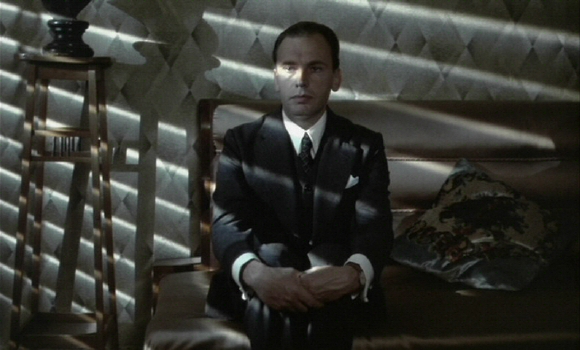
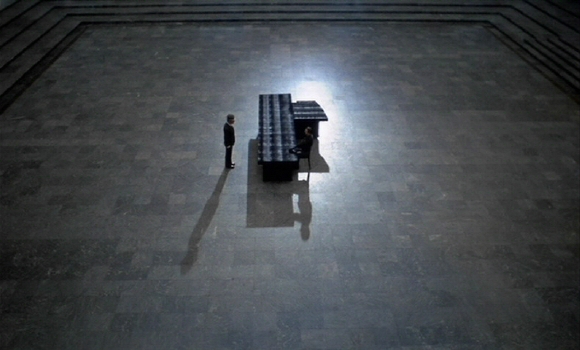
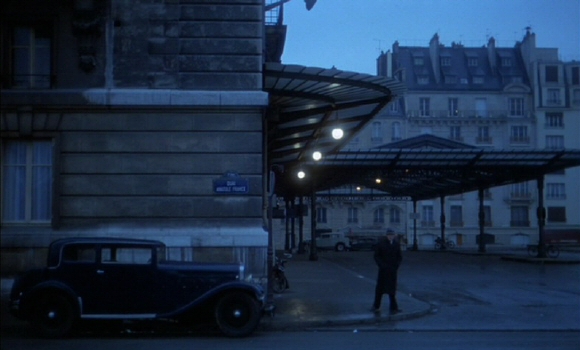
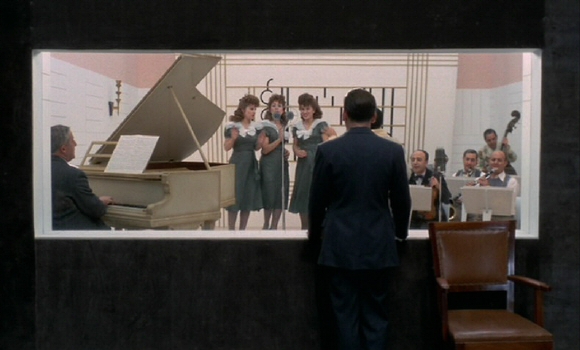
Losing it to the flames would, again, mean losing something forcefully unique and precious. I grab The Conformist, dither for a second by The Dreamers, but skee-daddle. I have confidence eva Green will do the right thing and be constantly naked in some other film. Here's hoping her careeer takes the Sally Kirkland route. I see Last Tango in Paris and The Last Emperor go up in a blaze and shrug. Does anybody like those movies? I guess even I'm guilty of indifference.
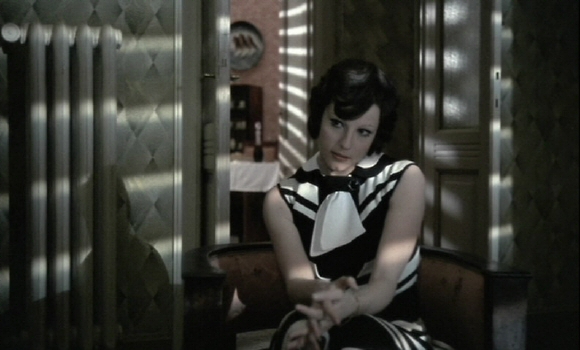
I place The Conformist down by the others and shoo away the chaw-dribbling nimrods who are kicking around nearby. These Texans are like a flock of strapping, truck-loving, hat-wearing cows. Goddammit, leave that cannister alone. And could somebody call the fire department? Oh, wait, here they are. How did I not hear their siren? Is there something wrong with my hearing? Does smoke inhalation do something to your ears? I shake my head all around. Seems ok. I rush up to the first firefighter down off the truck.
"Hey, get in there quick, there's some pricesless - "
"Relax there, buddy, we're on it."
I breathe a sigh of relief. So this isn't all on my shoulders. Hey, wait - what the fuck?!
"No, no, no - not the rodeo supply store!"
"Hey, pardner, now I said to relax and what I say goes. You don't want to mess with me. Got it? Now, there's some very important signage in there and once we get that situation under control we're going to check on the status of some of the saddles and go from there."
"But there are one of a kind artworks in the -"
Everyone freezes. A crowd's worth of eyes lock in on me. A small child begins to cry and clutch at his mommy.
"Um... as I was saying... there are, uh... priceless, singular... artworks."
"Art, buddy? You want us, us real American heroes from the great state of Texas to risk our necks for the sake of Art?"
"Listen -"
"No, you listen. And you ponder this: would Davy GD Crockett have risked his neck for art?"
"Well, I know Fess Parker wouldn't have."
"What are you getting at?"
Nevermind. I head back into the building. I glance over my shoulder. Not only is everyone eyeing me, they're all ominously stroking guns, even the little crying kid clutching at his mother. Are they going to put out the rodeo supply store fire or what?
In the warehouse is another world. A flaming, black-smoky world of cinema. And I know it's time. I've got to address Hitchcock and the question of his importance to cinema history. Because, I'm not really a fan. I know a lot of you will take this an aggressively iconoclastic stupidity, self-conscious posturing to show just what an elitist smarty-pants I am, but really... I'm just sorta not into his films. I've tried, believe me, I've tried. But truly, I don't think he made a transcendentally amazing film and I could spend hours debunking the ridiculous idea that he's primarily a visual filmmaker (watch Notorious with the sound off and try to explain to me literally anything going on in that movie - and, for God's sake, Rebecca climaxes in a 10 minute expository monologue where one character just stands there while the villain explains everything that's going on! And have you seen Dial M for Murder?! 90% of the film is just static shots of people standing around talking on the telephone!) and even more time taking apart the equally absurd notion that he's offering some kind of a commentary on psychology or human behavior or really anything at all (he's the classic case of "subject matter not a reflection of 'theme' but of 'personality'" - he's not examing the theme of misogyny, he's just a misogynist) or puzzling over the fact that everyone seems to be willing to forgive/ignore his drab, ugly, borderline incompetent later work (even if you can get over the virulent misogyny or the terrible cinematography, how can you deny the fact that films like Marnie, Torn Curtain and Topaz are just ruthlessly boring?) Also, I'm curious just who it is who's charmed by the moronic dimestore psychology running throughout his career in films like Psycho and Spellbound and Vertigo; it's irritating if he's serious and even more irritating if the master is just joshing, folks.

But, he's The Cinema Giant, the subject of more crappy psychoanalytic graduate school papers and fawning retrospective copy than any other filmmaker - by a country mile. There's no one who so conveniently straddles the boundaries between good ol' fashioned entertainment and Serious Art (disguised as good ol' fashioned entertainment, which is the au courant kind of Serious Art - hell, isn't that what I'm praising in Rodman Flender?***) - he's the man who sneaks sly jokes and commentary into his exquisitely crafted entertainment machines. If you lose Hitchcock, you lose cinema. So goes the thinking. Does my antipathy for the Master matter at the end of the day? Listen, we just had John's lengthy commentary on the same idea contemplating an even more dubious and inconsistent filmmaker, so we don't need to rehash it now. This place will be cinders before I convince you that maybe in general directors don't matter as much as they're purported to (film is the most collaborative art and cinematographers, producers, actors and editors affect the final product as much or more than any director), there's not really any such thing as genius (i.e. the outliers of artistic achievement aren't actually so decisively different from the average works) or if history had fallen a slightly differently then maybe some directors would be long forgotten and, say, Rodman Flender would be their replacement for graduate school papers and fawning retrospective copy.
Then I think of the yokels outside who don't even care. The sweaty masses who would be more than happy to see all I hold dear laid to waste. At the end of the day, I love Hitchcock because I love cinema and loving something means caring enough to have an opinion. A strong opinion. A well thought-out opinion. An opinion that goes against the grain and rubs some people the wrong way because at the end of the day you're fighting on behalf of something, fighting because you love it and care what happens to it. To fight against Hitchcock's reputation isn't a negative gesture, but the result of seeing his movies, thinking about what they mean and arguing because I've thought and felt and cared about the films. I passionately dislike Hitchcock because I give a damn Hitchcock because I give a damn about cinema. I've seen Suspicion, so if I care about movies at all, I have to say, "Wow, what a completely ridiculous performance from Cary Grant. What a bad movie." Towing the line is the same as indifference and the world is too full of people who don't care one way or the other about Hitchcock, who genuinely don't care if his films, Wilder's films, certainly Flender's films go up in a puff smoke. They wouldn't even notice. Even if I don't like Hitchcock's movies, it would kill me to loose them; it kills me any time a film is lost. I love even the movies I hate because I love movies.
So, what am I going to save? I think through the list of Hitch's films that I've seen. I happen to know the exact number of films (38) because I've tried really hard to appreciate and have searched to find an entry point, some film I like that turns the tide. Surely, there were a few I liked? On the one hand, if you've seen one Hitchcock, you've seen them all. The basic plot machinations are almost always the same: average Joe gets caught up in some diabolical narrative machinery which he scarcely understand.s I can think of three of his films I more or less liked: Strangers on a Train, Shadow of a Doubt and Saboteur. The Lady Vanishes has the excellent "our heros, holed up with no way out, are forced to shoot it out" ending - that sort of scenario is almost always great and I'm cool with idea of The Lady Vanishes being a spiritual sister to Assault on Precinct 13. But the rest of movie is typical unfunny Hitchcock comedy with endless scenes of his specialty: "average Joe (or Josephina) is deeply confused, menaced vaguely." Peter Lorre is awesome in the first version of The Man Who Knew Too Much, but there's a whole scene where the heroes and villains are fighting by throwing chairs at each other and the villains decide they need to do it more quietly, so they try to throw the chairs softly. It is as dumb as it sounds. And the opening ski scene is "fakey" and "stupid."
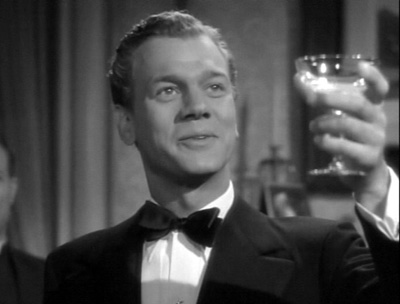
Strangers on a Train is right at the edge of the flames. It's the type of sturdy, unremarkable thriller Hitchcock supposedly made by the fistful - I don't think I'll be braving permant nerve damage and third degree burns for that one. It's fine, but it's no The Narrow Margin. Saboteur is cheesy as heck, featuring a script by Dorothy Parker brimming with corny one-liners. It features a typically circuitous, needlessly meandering Hitchcock plot, but it's a lot of fun. At one point, the heroes take up with a band of traveling circus freaks. It is as dumbs as it sounds. But the movie has a good sense ofhumor and it moves briskly from scene to scene. I could grab it, it's only a few feet away... but if I had to pick one Hitchcock and defend it as a truly interesting, remarkable film, it would be Shadow of a Doubt. Joseph Cotton is unforgettable as an eccentric relative who suddenly appears in the small-town life of Teresa Wright. Cotton's take on the charmer who may or may not be a cold-blooded criminal competes, in my mind, with The Third Man for his signature role. He effortlessly shifts gears between irresistible humor, troubling aloofness and ice-cold cynicism. Sure, the film has one of those endings (like, um... The Perfect Stranger) that makes all of Cotton's actions and behavior make absolutely no sense; but, of everything Hitchcock ever put on film, Cotton's monologues are the most direct expression of Hitchcock's troubled relationship to women and they are doozies. Cotton is the whole show - I guess it makes sense that the Hitchcock film I scoop up and carry out the building is the one in which the archetypal Hitchcock elements are the least effective/memorable pieces.
One of the firefighters grabs me by the arm just as I'm headed back in to the billowing cloud of black ash.
"Now hold on there. You can't go a-running back in-"
I shove him to the ground. The assorted crowd moves to the balls of their feet as though to descend on me, but I shoot them a glance that says "Don't mess with Texas? Don't fuck with me." I turn and stride purposefully into the inferno, it's time for a last ditch effort to save what I can. The Hitchcock room is toast - Rear Window, Vertigo, Psycho, North by Northwest... they're all gone. I grit my teeth and decide it's time to make amends. Through the blackest haze of smoke lies the door to the Wilder room. Through the nearly total shroud of grey, ashen darkness, I can still see that the flames haven't gotten to that door yet. I might not love Wilder... but I yield to no one in my love of Barbra Stanwyck and, if I have to pay penance for the sake of cinema, I'm grabbing Double Indemnity. It's a film I don't personally care about too much (I like it and everything - Stanwyck is cool in it and it'll always be nice to see Fred MacMurray as a pussy-hungry scumbag), but this is a film worth saving. It's one of the crucial Film Noir titles, part of that first batch of films to which the term was first applied. It has key examples of that classic Wilder dialog and I know for a fact that people love it. I can't argue with that.
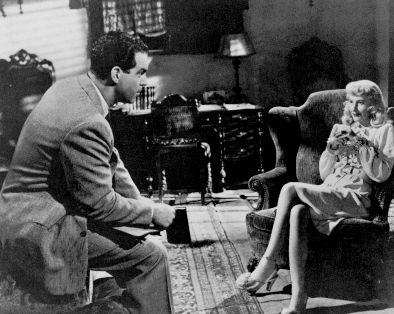
I kick down the door - BOOM. Why didn't I pay attention to that movie Backdraft? That's what just happened right? At any rate, I'm blown clear across the room. I can feel my collarbone shattered and what's... what's wrong with my arm. The smoke is so thick I can barely see. I gather my last ounce of strength and stumble to the Wilder cans. What the hell is Fedora? Last Weekend... no. Sabrina... shit, I like that one. Seven Year Itch... now no child will ever see the source of all those lady-in-a-dress-on-an-air-vent parodies... Here we go. Double Indemnity. I like Edward G. Robinson in this, too. Solid choice, Funderburg. I move to pick it up - ARRRGH, CHRIST ON A CRUTCH. In the explosion, I snapped my ulna and I can now see it poking through the skin on my forearm. With my uninjured appendage, I take up one cannister and, best I can, cradle the other against my chest. I take a step towards the way out and nearly pass out from the pain, the weighty metal can nearly buckling my broken bone. Slipping to one knee, I look up at the exit. It's no use. A wall of bright orange flames stretches out like an infernal Nurikabe. I curse under my breath. Damn this shoddy storage facility. Who builds a storage facility for rare 35mm prints out of cheap, crummy material? In an animalistic haze I bellow from the bottom of my lungs, rear down and run head first into the windowless wall at the back of the room. I wobble to my feet. A crack. Some light shines through. Smoke pours out.
Steeling myself, barely able to stand, the mere act of walking back across the room commands all my attention and focus. I get settled. I lower my head and charge head-first, full-speed, beat the devil directly at the crack - there's a sickening crunch of bone and metal and wood as I slam into it as at an alarming rate, smashing through the wall, the prints tumbling out of my arms safely onto the ground outside. I try to stand. My neck is snapped. I can't move. The crowd of Texans silently gathers around me. They stare passively, making no movement to pull me from the swiftly encroaching conflagration. I tilt my head, the only movement over which I have control, to look after the prints. The small boy, the one formerly clutching his mom and crying, stands over the pile of 35mm's, looking down at it, expressionless. I wonder if the lack of feeling in my legs means I won't know when the flames reach me. The boy crouches down to get a better look at the prints of...
NIGHT OF THE HUNTER IN THE HEAT OF PASSION DOUBLE INDEMNITY
SHADOW OF A DOUBT THE CONFORMIST
I hope they give that sausage pizza to a homeless guy or something. It would be a shame if they just threw it away.
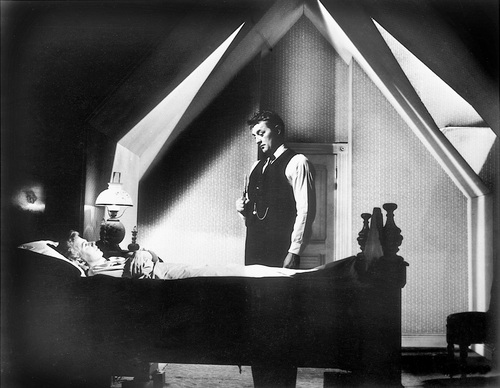
*** Let me be clear on this point: Flender is the wildcard, not the classy thing. He's not Hal Hartley and I still believe in High Art beyond and above popular entertainment. You should, too. High Art (and Super Bowl victories) are the finest things to which man can aspire.
<<Previous Page 1 2 Next Page>>
home about contact us featured writings years in review film productions
All rights reserved The Pink Smoke © 2010